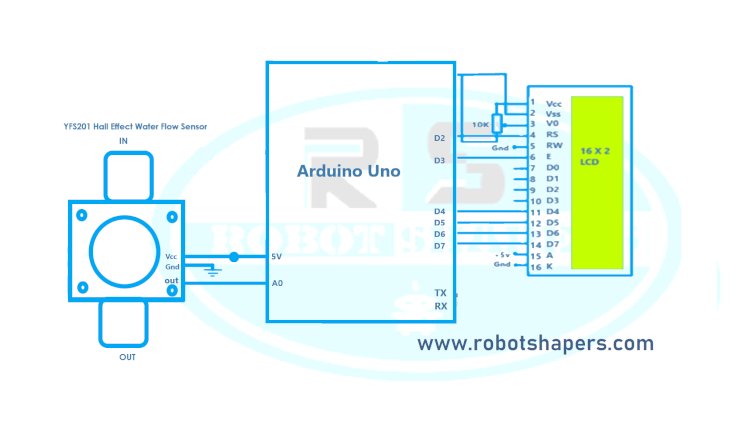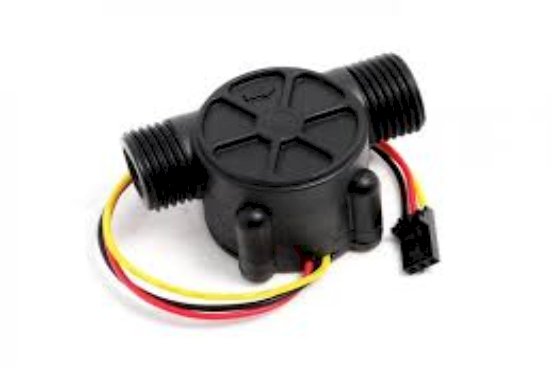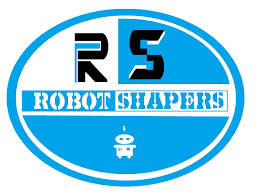Arduino water flow meter
Introducing the Arduino Water Flow Meter, a cutting-edge solution for accurate water flow measurement. Our flow meter utilizes advanced technology to provide real-time data on water consumption, enabling efficient water management and conservation.

With the YFS201 Hall Effect Water Flow Sensor at its core, our flow meter offers compact design, easy installation, and reliable measurements. From homes to industrial processes, it finds applications in water meters, plumbing systems, and HVAC control.
Monitor flow rates, detect abnormalities, and optimize water usage with our flow meter's digital inputs, data logging capabilities, and connectivity options. At Robotshapers, we shape the future of water management, promoting sustainability and smart resource allocation.
Visit Robotshapers.com and flow into a new era of water management efficiency. Shape your water usage with Robotshapers - Where Precision Meets Flow.
A flowmeter is a device used to measure the volume or velocity of water flowing through a pipe or system. It provides accurate, real-time information on water usage to monitor, manage and manage water resources efficiently.
Water flow meters are available in several types, including electromagnetic, ultrasonic and turbine flow meters. Mechanical flowmeters use mechanical devices to measure water flow, while electromagnetic and ultrasonic flowmeters use electrical and sound waves to determine flow. Turbine meters use a rotating rotor that rotates in response to the water flow.These meters are often installed in residential, commercial and industrial environments, including homes, buildings, water pipes, water treatment plants, and industrial processes. They play an important role in water management, detection, accurate billing and overall water savings. Water meter has features such as digital inputs, data logging features and connectivity options for integration with remote monitoring and control systems. They provide water links with important information for making good decisions and efficient water use.
Flow meters help conserve water, save money and improve the performance of many applications by accurately measuring water, making them an essential tool for water management and stable energy use.
Components Required:
- Arduino Uno
- YFS201 Hall Effect Water Flow Sensor
- 16x2 LCD Display
- 10 K Variable resistor
- 12V DC power supply
YFS201 Hall Effect Water Flow Sensor:
The YFS201 Hall Effect Water Flow Sensor is a device for measuring fluid flow in a pipeline or system. It uses the Hall effect principle to detect the movement of the magnetic field along the fluid flow in the sensor. As the liquid passes through the sensor, it creates a magnetic field that is sensed by the Hall Effect sensor, which produces an electrical signal proportional to the flow.
YFS201 water flow sensor is compact, easy to install and provides accurate measurements. Usually there is a lot of mileage and is specified by the manufacturer.
The sensor is often used in applications such as water meters, plumbing, industrial processes and HVAC systems to monitor and control water flow. YFS201 Hall Effect Water Flow Sensor is reliable and compatible with a wide range of fluids, making it reliable for water measurement and control across the industry.

Circuit Diagram:

Arduino source code:
#include
LiquidCrystal lcd(2,3,4,5,6,7);
int A;
int B;
float pass = 0;
float Freq = 0;
float Rate = 0;
float Vol = 0;
float Lsec = 0;
const int input = A0;
void setup()
{
Serial.begin(9600);
lcd.begin(16, 2);
pinMode(input,INPUT);
lcd.setCursor(0,0);
lcd.print("ROBOTSHAPERS");
lcd.setCursor(0,1);
delay(1500);
lcd.print("FLOW METER");
delay(1500);
lcd.clear();
}
void loop()
{
A = pulseIn(input, HIGH);
B = pulseIn(input, LOW);
pass = A + B;
Freq = 1000000/pass;
Rate = Freq/7.5;
Lsec = Rate/60;
if(Freq >= 0)
{
if(isinf(Freq))
{
lcd.clear();
lcd.setCursor(0,0);
lcd.print("Rate:0.00");
lcd.setCursor(0,1);
lcd.print("Vol:");
lcd.print( Vol);
lcd.print("L");
}
else
{
Vol = Vol + Lsec;
Serial.println(Freq);
lcd.clear();
lcd.setCursor(0,0);
lcd.print("Rate:");
lcd.print(Rate);
lcd.print("L/min");
lcd.setCursor(0,1);
lcd.print("Vol:");
lcd.print(Vol);
lcd.print("L");
}
}
delay(1000);
}
Applications:
Water flow meters have many applications in many industries and environments, as they can accurately measure and monitor water flow. Some of the applications are:
Domestic Water: Homes and buildings use water flow to measure the water used, fix bills and encourage people to conserve water.
Commercial and Industrial Environments: Flow meters are used in commercial buildings, factories, and industrial processes to monitor water usage, identify leaks or defects, and maintain good flow for good work.
Irrigation Systems: Flow meters are integrated into the water pipes to measure the water flow to the fields, ensuring the best water quality and preventing waste water.
Water Treatment Plants: Flowmeters, which play an important role in water treatment plants, measure the water flow at various stages of the treatment process and provide approval, disinfection and distribution.
Flow detection: Flow meters can detect abnormal flow patterns to help identify and locate leaks in water distribution systems, conserve water and prevent damage.
Environmental Monitoring: Flow meters used in environmental research and monitoring programs to measure water flow in rivers, streams and other water bodies provide important information for water management.
HVAC Systems: Flow meters are used in heating, ventilation and air conditioning (HVAC) systems to measure water flow for better temperature control and energy efficiency.
Research and Development: Flowmeters are an essential tool in research and development, allowing to measure and measure water flow in experimental setups and test sites.

 Arindam Deshmukh
Arindam Deshmukh 
















